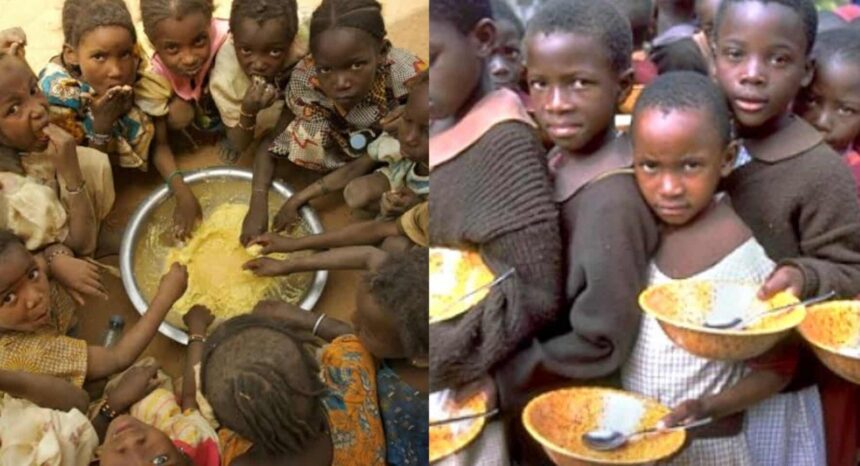Nigeria’s hunger crisis has continued to deepen as the latest Global Hunger Index (GHI) report delivered a sobering assessment for Africa’s most populous nation, ranking the country 115th out of 123 countries.
This position confirms the deepening severity of Nigeria’s hunger crisis, placing it in the ‘serious’ category of hunger.
According to the GHI, Nigeria’s poor performance is calculated based on four indicators: undernourishment, child stunting, child wasting, and child mortality.
From a position of 110th and a ‘serious food crisis’ point of 28.8 amongst 123 countries in 2024, Nigeria plunged deeper into the serious food crisis zone a year later.
The data reveals that Africa’s most populous nation has been within the serious food crisis range in the last 17 years, rising only slightly from 32.3 points in 2008 to 32.8 points in 2025.
The GHI is a tool that measures and tracks hunger at global, regional, and national levels. It is an annual report published jointly by Concern Worldwide and Welthungerhilf.
Between 2020 and 2024, 11.6 percent of children in the country now suffer from high levels of child wasting, 10.5 percent of the same population die before they turn five, according to the GHI 2025 report.
It links killings of farmers, exceptional heavy rainfall and devastating floods that ravaged farms in the early parts of this year to be a major driver of food insecurity.
Several Nigerians, including farmers across major food producing states were victims of flood that wiped out large hectares of farms and rendered thousands of people homeless.
“The 20th edition of the Global Hunger Index comes at a moment of rising alarm about food security globally and in certain regions and hotspots. Development finances are under extreme stress, the humanitarian sector is struggling, and in some areas hunger is persistent or even growing,” the report wrote.
The data noted that Nigeria is the second country in West Africa within the ‘serious food crisis’ zone.
Speaking of Nigeria’s hunger crisis, the Country Representative of Propcom+ Nigeria, Dr Adiya Ode, expressed concern that the situation may worsen, considering that over 31.8 million Nigerians are already suffering from acute food insecurity.
Ode also lamented the increasing level of malnutrition and child stunting in Nigeria, compounding the hunger crisis, and advocated a renewed strategy to make food affordable.
Ode committed Propcom+, a UK support agency, to partner with the government in driving food security initiatives through climate-smart and market-driven solutions.
“Our partnerships are the cornerstone of this mission. A good example is the partnership with the Kano State Government and HarvestPlus, which is strengthening the seed-to-shelf journey of nutrient-dense foods, ensuring that farmers earn more, consumers eat better, and markets grow stronger.
“These partnerships remind us that transformation happens fastest when collaboration leads the way, just like the theme of this year’s World Food Day states.
“But we know that real change happens when more partners join in. That’s why we continue to invite the private sector, investors, and policymakers to collaborate with us — to expand innovation, scale impact, and unlock the full potential of Nigeria’s agrifood sector,” Ode said.
However, Country Manager, HarvestPlus Nigeria, Dr Yusuf Dollah Fu’ad, was optimistic that Nigeria can overcome the food crisis if the government enhances farmers’ productivity with nutrient-enriched staple crops.
He believed that the food-based approach remains one of the most cost-effective and sustainable solutions to tackling hidden hunger in Nigeria since most communities consume what they produce.
“The National Food Consumption and Micronutrient Survey shows that most people in our rural communities consume what they produce from their farms. This presents a great opportunity — when farmers cultivate nutrient-enriched staple crops, they gain direct access to the essential vitamins and micronutrients their families need.
“This makes the food-based approach one of the most cost-effective and sustainable solutions to tackling hidden hunger in our communities. However, for us to make lasting progress, we must coordinate our nutrition efforts more effectively,” Fu’ad noted.





